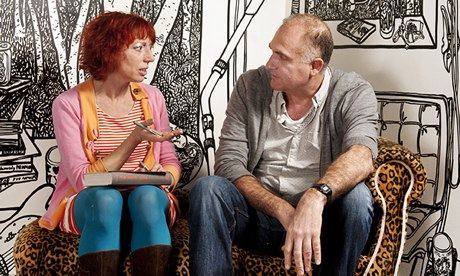
It is more than 20 years since I was last on a therapist's couch. My shrink's technique was to sit behind me and say almost nothing for 50 minutes. The therapy didn't end well for either of us.
This time around the experience is considerably more rewarding. For one thing, my therapist, Ella Berthoud, is sitting opposite and maintaining eye contact. For another, we're talking about books, a subject I am much happier wittering on about than the murkier recesses of my psyche. Ella is a bibilotherapist – a book doctor. She listens to people talking about what is going on in their lives and recommends books that might help. A reading cure, rather than the talking cure.
Not that Ella considers this psychotherapy. Rather, she sees her work as a means of nudging people towards books they might have missed out on. Books that offer rewards through the quality of the writing and parallels with the reader's life.
She starts by asking me about my reading habits as a child. I have no memory of either parent reading to me: all I can picture is me working my way through the entire works of Paddington, Jennings, Biggles and Sherlock Holmes.
I start to think about how self-contained my reading is. I read to split off into my own imagination, to go at my own pace. It's a process of detachment. The pleasure in sharing a book only comes after it's been read.
Over the course of the hour-long session, I talk about what I've read, what I haven't (people invariably assume I'm better read than I am), and what I want out of a book. That last bit is easy. "I want to be entertained and challenged," I say. "Above all, I don't want to have my time wasted. Too many novels don't have anything interesting to say and take too long to say it. Save me from late Henry James."
Three days later, my prescription arrives by email. Ella's diagnosis is that I am book-rich and time-poor. Her treatment is a list of novels under 350 pages. First up, Thomas Mann's the Holy Sinner. "Based on the legend of Pope Gregory, who married his mother and killed his father, Mann explores morality, sin and redemption," Ella writes. "Reading this gives you a window into Mann's mind without having to spend months in his company."
Also on her list are the Short Stories of Saki ("You said you enjoy short stories but too many anthologies have duds in them. Many would say there are no duffers here, but I would particularly recommend Tobermory, concerning a cat who is taught to speak, by his owner who then regrets it."); Depresso by Brick ("partly because it's about depression and partly because it's a graphic novel, which you seldom read"); and Flowers for Algernon by Daniel Keyes ("I can't resist suggesting an excellent example of the sci-fi genre that will defy your expectations.")
I feel surprisingly excited. Understood, even. Within minutes, I order the Holy Sinner off Amazon. At 1p plus £2.80 postage and packing, what could possibly go wrong?

